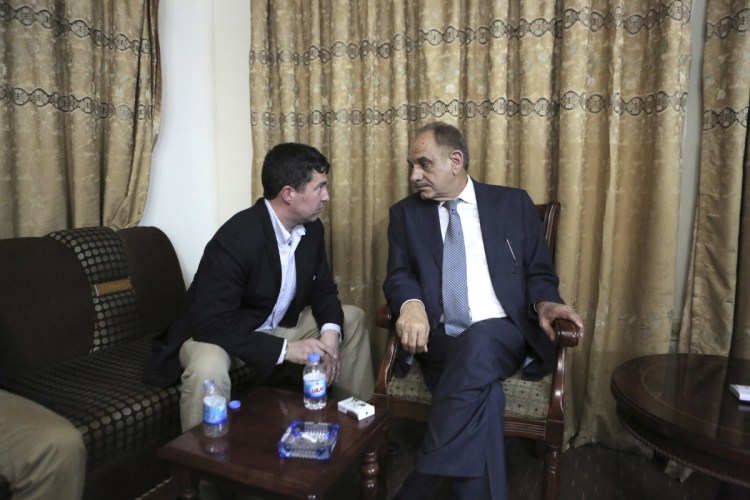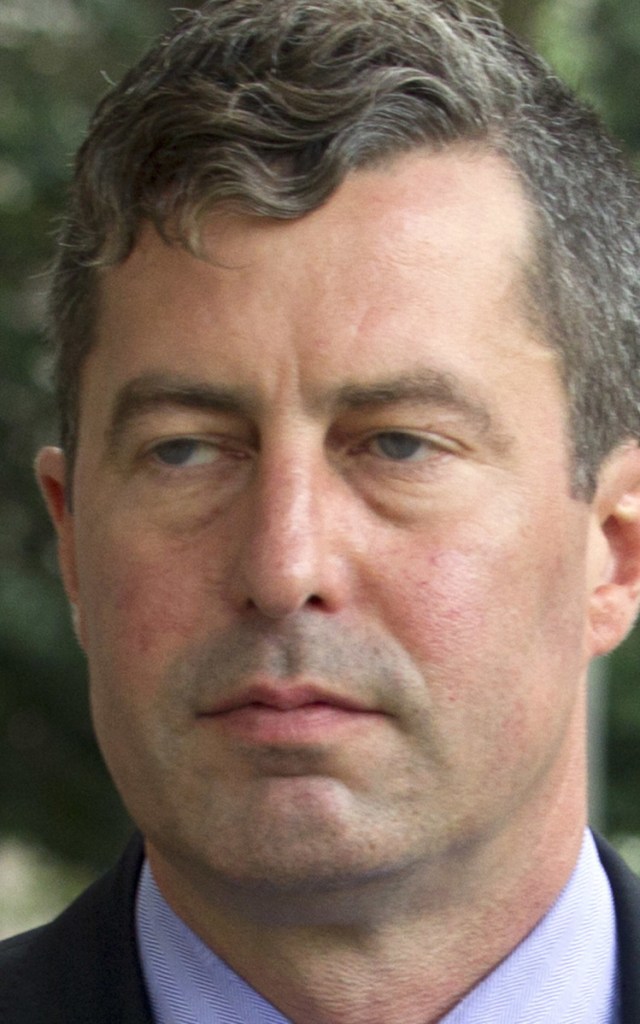Four years before working to boost participation in Iraq’s first democratic elections in generations – and nearly two decades before his lobbying for foreign clients drew scrutiny from special prosecutor Robert Mueller’s investigators – Sam Patten was helping lead a political ground game in Maine.
“Pulling in some kind of a big-league speaker at this point is not going to change the nature of the game,” a 29-year-old Patten, then George W. Bush’s campaign coordinator in Maine, said one day before the historically close 2000 election. “In order to win, we’ve just got to concentrate on getting out our voters and also making our very best possible effort at making our case in the remaining hours to independents, undecided voters and fair-minded Democratic voters.”
For nearly a quarter-century, the Camden native and grandson of a well-known Washington, D.C., political socialite embedded himself in campaigns from Bangor to Baghdad. Patten worked with congressional candidates, nonprofits espousing democracy in troubled nations and also mega-corporations and foreign political parties willing to pay big bucks for access.
He advised opposition leaders in Russia and helped elect a pro-NATO president of Georgia (only to help elect his Russian-backed replacement eight years later). An international adviser pledging to deliver “commitment, discretion and high-impact solutions” to clients, Patten has also worked in multiple countries where on-the-ground political consulting requires a cadre of heavily armed security guards.
“People like me are not agents of change,” Patten told The Washington Post in 2014, when he was being paid $20,000 a month to advise an official hoping to be elected Iraq’s prime minister. (He wasn’t). “We’re helpers, perhaps enablers, of a historical process that is going to happen eventually, one way or another.”
Yet playing the enabler or foreign power broker – in political environments with few rules but plenty of available cash – can also be a risky, messy business. And for Patten, the mess has turned very real, with potentially damaging consequences.
FASCINATED BY RUSSIA EARLY ON
Last month, the 47-year-old pleaded guilty to failing to register as a “foreign agent” while lobbying members of Congress and the executive branch on behalf of Ukrainian political clients. He also arranged for an illegal donation from a Ukrainian citizen to President Trump’s inaugural committee – and then misled the Senate Intelligence Committee about the arrangement.
Patten’s partner in the lobbying business and in arranging for the “straw donor” donation to Trump’s inaugural committee, Russian citizen Konstantin Kilimnik, is a business partner of Paul Manafort, the former Trump campaign chairman at the center of the swirl of allegations over Russian meddling in the 2016 elections.
Patten was even listed as a potential witness in Manafort’s second trial before Manafort pleaded guilty earlier this month to conspiring to defraud the U.S. of taxes and conspiring to obstruct justice.
It’s a long way from Camden-Rockport High School, where Patten graduated in 1989, and his early political years working for the likes of Republican Sens. Bill Cohen, Olympia Snowe and Susan Collins of Maine.
News of Patten’s Aug. 31 guilty plea and potential involvement in the high-profile Manafort case caught the attention of some in the Camden area, where his father, Bill, once occupied a prominent position as the former owner of the Camden Herald weekly newspaper.
Doug Hufnagel, a former Camden Herald columnist who worked for Bill Patten, said he was surprised the son would “fall into” that sort of situation. Hufnagel remembered Sam Patten as studious and bright but also the type of child who benefited from his family’s wealth and political connections.
“Sam would be a perfect example of someone who comes from money,” Hufnagel said. “How did he end up working for Susan Collins or working for William Cohen? The door was opened because of his father.”
At the same time, Hufnagel recalled an interesting – and enlightening, given recent events – conversation sometime after Sam Patten had graduated from college. Patten talked about plans to try to work in the oil industry in Russia or other former Soviet bloc countries – a concept that Hufnagel said “seemed absurd to me at the time.” But Patten followed through on his plans, eventually creating an advisory firm in Kazakhstan in the late-1990s that “provided public and government relations” services to such clients as Texaco, Coca-Cola and the Fortune 500 power company AES Corp., according to his website.
“Even back then, he had his eye on that part of the world,” Hufnagel said.
Patten and his attorney both declined to talk about his career or his current legal situation.
“Neither I or Mr. Patten will be making any statements or answering questions at this time,” Patten’s attorney, Stuart Sears, said earlier this month. “Should that change, I will let you know.”
The Portland Press Herald/Maine Sunday Telegram also reached out to multiple campaign or political staffers who worked with Patten in Maine as well as a number of Washington, D.C., consultants who knew Patten, but all either did not return phone calls or declined to comment.
However, previous media accounts in Maine and around the world illustrate Patten’s career path from a congressional intern from Maine to a highly compensated consultant providing advice – and access – to foreign clients.
After graduating from Camden-Rockport High School, Patten attended Georgetown University in the same affluent D.C. neighborhood where his grandmother, the late Susan Mary Alsop, entertained Washington’s political and social elite. Alsop’s second husband was the nationally syndicated political columnist Joseph Alsop.
FOSTERING DEMOCRACY ABROAD
After graduating from Georgetown, Patten worked as press secretary during Collins’ failed gubernatorial campaign in 1994 and then served as finance director for her successful Senate bid two years later. In 1996, according to a story in The Washington Post, Patten suffered a knife wound to the hip while trying to protect his grandmother when the two were mugged while walking home from dinner in Georgetown.
After his stint advising corporations interested in investing in Kazakhstan, Patten returned to Maine to work as a spokesman and campaign coordinator for Bush’s 2000 presidential campaign.
Dwayne Bickford, a former executive director of the Maine Republican Party, said he crossed paths with Patten numerous times during those years as the young politico worked on campaigns in the state, although they never worked closely together. Bickford said he periodically followed Patten’s work as he shifted his focus overseas.
“He seemed like a smart, intelligent and nice guy,” Bickford said.
Patten would spend much of the next decade working on democracy-related issues in countries around the world.
From 2001 to 2004, he led the Moscow office of the International Republican Institute, a nonpartisan organization funded by Congress – along with the National Democratic Institute for International Affairs – that works on “democracy development” in more than 30 countries. Patten worked with nongovernmental organizations as well as democracy-promoting political organizations and candidates – including the pro-capitalism opposition leader Boris Nemtsov, an outspoken critic of Russian President Vladimir Putin who was later assassinated.
Later in 2004, Patten was working for the International Republican Institute in Iraq as that country prepared for the first open elections since the U.S. invasion helped topple Saddam Hussein. As the organization’s political director in Iraq, Patten strove to educate Iraqis about the election process as the country prepared to create a new parliament and to bring together different political groups, or factions, to start the coalition-building process.
He told the Press Herald at the time of the January 2005 elections that it was the type of basic “get-out-the-vote” efforts that he and others employed in political races in Maine and throughout the U.S., including focus groups and producing television commercials. But rather than showing up at the polls with the “four or five foreign, heavily armed” security guards that had to accompany him around Iraq, Patten watched the results from his Baghdad building and was delighted by the massive turnout despite the threats of violence by extremist groups.
“There continues to be gunfire throughout tonight, and I think that insurgents are going to want to make some kind of statement … to punish people for having voted,” Patten told the Press Herald. But “the fact that so many Iraqis went out and voted today is an extraordinary act of courage and a very strong reflection on these people. It reflects very well on the future.”
‘CHASING JEFFERSONIAN SUNBEAMS’
As it turned out, Iraq’s transition to democracy was not smooth. A decade later, in 2014, Patten was still having to surround himself with armored glass and security guards as he advised Saleh Mutlaq – then Iraq’s deputy prime minster – as he ran for prime minister. As The Washington Post put it in a profile of this American advising an Iraqi candidate, Patten was still “chasing Jeffersonian sunbeams in a country where bombs keep going off” but was getting paid $20,000 a month to do it, although the consultant said that didn’t cover all of his enormous expenses.

Sam Patten talks with lawyer Riad al-Samarrai in Baghdad, Iraq, in 2014. Patten was a political force in his home state as well as abroad, playing key roles in Susan Collins’ Senate bid and George W. Bush’s 2000 presidential campaign.
“It’s one thing to be a star adviser to a campaign in, say, the United Kingdom,” the Post piece reads, “and another to ’embed,’ as Patten puts it, in an untidy, austere apartment in Jordan for four months and shuttle regularly to Baghdad, requiring an armored SUV to visit his candidate.”
A year later, Patten would form another international consulting firm – Begemot Ventures International, offering “influence without borders” – with a Russian citizen he worked closely with while heading the Moscow office of the International Republican Institute. It was that person, Konstantin Kilimnik, who would later become Paul Manafort’s close business associate while working in Ukraine and who special prosecutor Robert Mueller’s team reportedly views as having close ties to Russian intelligence.
Between 2015 and 2017, Begemot Ventures received more than $1 million from the Ukrainian Opposition Bloc and for other Ukrainian consulting work, according to Patten’s plea agreement with federal prosecutors. Patten pleaded guilty to failing to register as a “foreign agent” for his lobbying work to “influence United States policy” and efforts to set up meetings between Ukrainian political figures and members of Congress or their staff.
Additionally, Patten admitted to working with a Russian national – widely believed to be Kilimnik – to help a Ukrainian citizen donate $50,000 to President Trump’s inaugural committee. The pair reportedly used a “straw donor” to secure inaugural tickets because foreign nationals are prohibited from contributing. The three men plus a fourth unnamed person then attended the inaugural celebrations.
PATTEN FACES FIVE YEARS IN PRISON
Patten faces up to five years in prison for the charges to which he pleaded guilty, although he agreed to cooperate with prosecutors in hopes of leniency during sentencing. The timeline for those events is unclear, given Manafort’s recent guilty plea.
But in a Facebook post immediately after his guilty plea – which is no longer publicly available but was preserved by a “friend” on the social media network – Patten apologized “for the embarrassment this lapse in my own high professional standards has caused my family, my friends and my past and present work associates.” Patten went on to say that he dedicated much of his career in international politics to “helping democratic forces engage in competitive, non-violent election campaigns and helping improve governance in challenging parts of the world.”
“I am ashamed that failing to register (as a foreign agent) in these instances undermines much of my life’s work, and am committed to making amends for this transgression,” he wrote.
Kevin Miller can be contacted at 791-6312 or at:
kmiller@mainetoday.com
Twitter: KevinMillerPPH
Send questions/comments to the editors.




